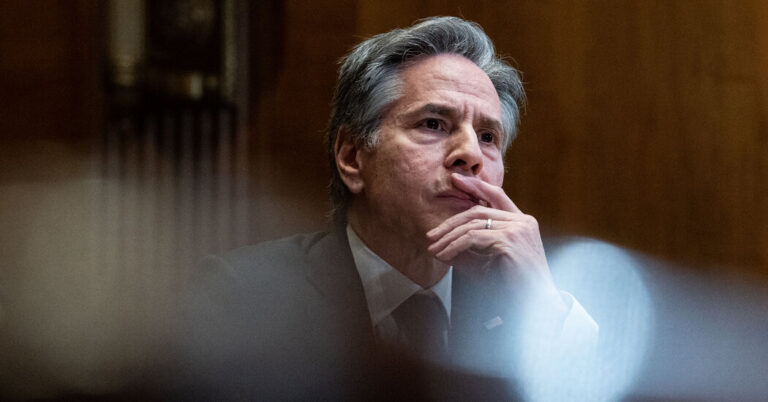Secretary of State Antony J. Blinken plans to spend this week showing U.S. support for nations facing a hostile Russia in visits to Moldova and the Czech Republic, where he is scheduled to attend a meeting of NATO foreign ministers that will discuss how to bolster Ukraine.
Mr. Blinken, who made an overnight stop in Kyiv more than two weeks ago, is expected to fly into Chisinau, the capital of Moldova, on Wednesday and meet with Maia Sandu, the nation’s president, who is running for re-election. Ms. Sandu has advocated for Moldova to join the European Union, and she has scheduled a referendum vote on E.U. membership on the same day as the general election in October.
She is expected to run against a pro-Russia candidate, and U.S. and European analysts say Moscow is likely to try to interfere in the election, as it has in other votes in Europe. The Biden administration has spoken publicly of Russian agents carrying out such interference using a variety of means, from hacking to boosting campaigns over social networks to doling out money to favored politicians.
U.S. officials said Mr. Blinken would speak with Ms. Sandu and other top officials about potential threats to the country’s democratic processes, as well as efforts to wean the nation off electricity generated in the pro-Russia separatist region of Transnistria. Moldova recently ended its reliance on gas imports from Russia.
“I anticipate he’ll have a robust package of support for Moldova’s transition, both energy independence or less dependence on sources to the east but also on support for democracy against Russian threats,” James O’Brien, the assistant secretary of state for European and Eurasian Affairs, said in a phone call with reporters on Friday.
Mr. Blinken plans to announce more details of American aid to address these issues during his visit, Mr. O’Brien said.
He added that the secretary’s message would “highlight Moldova’s progress in its path toward European integration, its solidifying its democracy, and the threat posed by the Russian interference in its internal processes.”
About 1,500 Russian troops are in Transnistria, which is in the east of Moldova and borders Ukraine. U.S. officials are watching closely for any signs that President Vladimir V. Putin of Russia might try to annex the territory. Russia officially says it seeks a special status for Transnistria.
In the Czech Republic, which State Department officials now call Czechia, following the lead of the country’s government, Mr. Blinken plans to attend a two-day planning session of the North Atlantic Treaty Organization and meet with Czech officials.
The NATO session in Prague, the nation’s capital, is aimed at preparing for the 80th anniversary meeting of alliance leaders in Washington in July. The group is not expected to declare that Ukraine is joining NATO now, an aspiration that President Volodymyr Zelensky has stated repeatedly both before and after Russia’s full-scale invasion, which began in 2022. However, NATO officials in Prague are expected to work out the details for a substantial show of support for Ukraine’s progress toward joining NATO, and those will be announced in July, Mr. O’Brien said.
Russian troops are pressing an offensive in Kharkiv, Ukraine’s second-largest city. The Ukrainian war effort has been flagging in large part because of a shortage of weapons and munitions, and there are fewer citizens able to join the fight. President Biden recently signed into law a bill passed by Congress, despite some Republican opposition, that grants new tranches of military aid to Ukraine, as well as to Israel.
However, Russia is producing munitions at a rapid rate, and U.S.-led sanctions against the nation have not crippled its military industrial capabilities, as Americans officials had once hoped. Mr. Biden and his aides say China has played a decisive role in bolstering Russia through the sale of dual-use equipment and other exports that have allowed Moscow to strengthen weapons production. Mr. Blinken is expected to highlight China’s support for Russia in his discussions with NATO counterparts in Prague.

